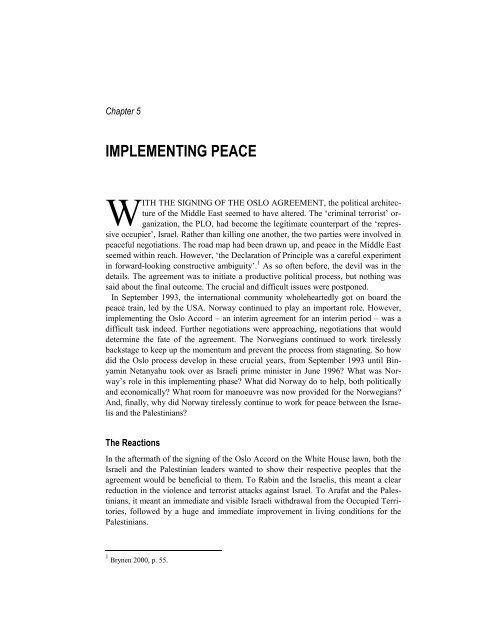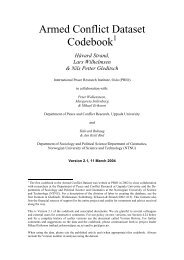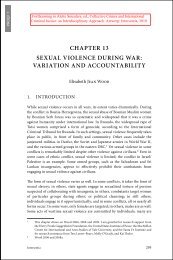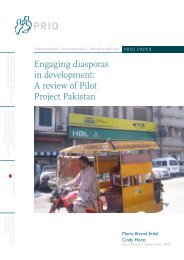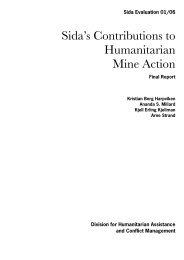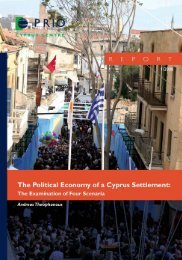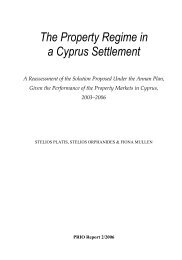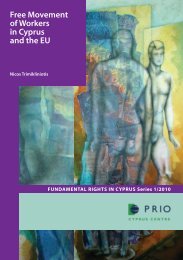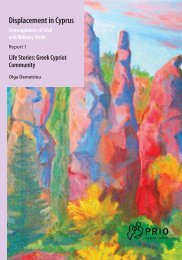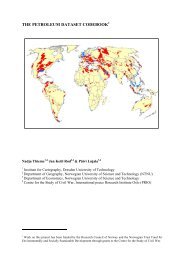- Page 4:
Institutt for fredsforskningInterna
- Page 7:
PREFACEIN JANUARY 2001, it was agre
- Page 10 and 11:
2 ‘Peacemaking Is a Risky Busines
- Page 12 and 13:
4 ‘Peacemaking Is a Risky Busines
- Page 14 and 15:
6 ‘Peacemaking Is a Risky Busines
- Page 16 and 17:
8 ‘Peacemaking Is a Risky Busines
- Page 18 and 19:
10 ‘Peacemaking Is a Risky Busine
- Page 21 and 22:
Chapter 1THE ROAD TO OSLOIDEALLY, M
- Page 23 and 24:
The Road to Oslo15Palestinians real
- Page 25 and 26:
The Road to Oslo17new Israeli gover
- Page 27 and 28:
The Road to Oslo19than ever. The Re
- Page 29 and 30:
The Road to Oslo21acceptance of the
- Page 31 and 32:
The Road to Oslo23After 1945, the i
- Page 33 and 34:
The Road to Oslo25headway. The new
- Page 35 and 36:
The Road to Oslo27The Madrid Confer
- Page 37:
The Road to Oslo29cial framework of
- Page 40 and 41:
32 ‘Peacemaking Is a Risky Busine
- Page 42 and 43:
34 ‘Peacemaking Is a Risky Busine
- Page 44 and 45:
36 ‘Peacemaking Is a Risky Busine
- Page 46 and 47:
38 ‘Peacemaking Is a Risky Busine
- Page 48 and 49:
40 ‘Peacemaking Is a Risky Busine
- Page 50 and 51:
42 ‘Peacemaking Is a Risky Busine
- Page 52 and 53:
44 ‘Peacemaking Is a Risky Busine
- Page 54 and 55:
46 ‘Peacemaking Is a Risky Busine
- Page 56 and 57:
48 ‘Peacemaking Is a Risky Busine
- Page 59 and 60:
Chapter 3THE MODEST FACILITATOR‘T
- Page 61 and 62:
The Modest Facilitator53state. The
- Page 63 and 64:
The Modest Facilitator55overcome. F
- Page 65 and 66:
The Modest Facilitator57accident. I
- Page 67 and 68:
The Modest Facilitator59The Oslo op
- Page 69 and 70:
The Modest Facilitator61underground
- Page 71 and 72:
The Modest Facilitator63kinds of st
- Page 73 and 74:
The Modest Facilitator65and I will
- Page 75 and 76:
The Modest Facilitator67ister Rabin
- Page 77 and 78:
The Modest Facilitator69had been -
- Page 79 and 80:
The Modest Facilitator71Rød Larsen
- Page 81 and 82:
The Modest Facilitator7379 and in W
- Page 83 and 84:
The Modest Facilitator75such an app
- Page 85 and 86:
The Modest Facilitator77be accused
- Page 87 and 88:
The Modest Facilitator79former US s
- Page 89 and 90:
The Modest Facilitator81providing c
- Page 91 and 92:
The Modest Facilitator83the importa
- Page 93 and 94:
Chapter 4THE ACTIVE MEDIATORAFTER F
- Page 95 and 96:
The Active Mediator87retary in the
- Page 97 and 98:
The Active Mediator89of the session
- Page 99 and 100:
The Active Mediator91But Rabin was
- Page 101 and 102:
The Active Mediator93They agreed to
- Page 103 and 104:
The Active Mediator95come first. At
- Page 105 and 106:
The Active Mediator97Singer taking
- Page 107 and 108: The Active Mediator99A frustrated A
- Page 109 and 110: The Active Mediator101However, the
- Page 111 and 112: The Active Mediator103the second ph
- Page 113 and 114: The Active Mediator105areas. In fac
- Page 115 and 116: The Active Mediator107ings and emot
- Page 117 and 118: The Active Mediator109DoP. For the
- Page 119 and 120: The Active Mediator111Peres had pre
- Page 121 and 122: The Active Mediator113legitimacy fo
- Page 123 and 124: The Active Mediator115In Israel, R
- Page 125 and 126: The Active Mediator117Washington. 1
- Page 127 and 128: The Active Mediator119the changed I
- Page 129 and 130: The Active Mediator121an extra trip
- Page 131 and 132: The Active Mediator123Palestinians
- Page 133 and 134: The Active Mediator125The points of
- Page 135 and 136: The Active Mediator127point of view
- Page 137 and 138: The Active Mediator129Peres knew th
- Page 139 and 140: The Active Mediator131all Israelis
- Page 141 and 142: The Active Mediator133asleep, but w
- Page 143 and 144: The Active Mediator135Three major i
- Page 145 and 146: The Active Mediator137ment would be
- Page 147 and 148: The Active Mediator139ting guarante
- Page 149 and 150: The Active Mediator141Informing the
- Page 151 and 152: The Active Mediator143was willing t
- Page 153 and 154: The Active Mediator145At the meetin
- Page 155 and 156: The Active Mediator147demanded that
- Page 157: The Active Mediator149There were tw
- Page 161 and 162: Implementing Peace153Reactions in I
- Page 163 and 164: Implementing Peace155Johan Jørgen
- Page 165 and 166: Implementing Peace157tries. The Osl
- Page 167 and 168: Implementing Peace159settler fashio
- Page 169 and 170: Implementing Peace161influence both
- Page 171 and 172: Implementing Peace163passed among t
- Page 173 and 174: Implementing Peace165tion would not
- Page 175 and 176: Implementing Peace167transferred th
- Page 177 and 178: Implementing Peace169tions, subsect
- Page 179 and 180: Implementing Peace171rule areas had
- Page 181 and 182: Implementing Peace173donor programm
- Page 183 and 184: Implementing Peace175France was gen
- Page 185 and 186: Implementing Peace177Washington and
- Page 187 and 188: Implementing Peace179way fielded an
- Page 189 and 190: Implementing Peace181World Bank mus
- Page 191 and 192: Implementing Peace183tary force. On
- Page 193 and 194: Implementing Peace185slowly. The se
- Page 195 and 196: Implementing Peace187sponsible for
- Page 197 and 198: Implementing Peace189SWG, Norway wa
- Page 199 and 200: Implementing Peace191pointed out, a
- Page 201 and 202: Implementing Peace193issue’ durin
- Page 203 and 204: Implementing Peace195Israeli judgem
- Page 205 and 206: Implementing Peace197tween promises
- Page 207 and 208: Implementing Peace199tinian self-ru
- Page 209 and 210:
Implementing Peace20135% earlier. A
- Page 211 and 212:
Implementing Peace203According to S
- Page 213 and 214:
Implementing Peace205During 1995, t
- Page 215 and 216:
Implementing Peace207Norway did not
- Page 217 and 218:
Implementing Peace209its results sh
- Page 219 and 220:
Implementing Peace211in the Israeli
- Page 221 and 222:
Implementing Peace213pare for the T
- Page 223 and 224:
Implementing Peace215solution to th
- Page 225 and 226:
Implementing Peace217for Jewish set
- Page 227 and 228:
Implementing Peace219the Likud Part
- Page 229 and 230:
CONCLUSIONTHE SIGNING OF THE OSLO A
- Page 231 and 232:
Conclusion223when votes were cast o
- Page 233 and 234:
Conclusion225working with Middle Ea
- Page 235 and 236:
Conclusion227Palestinian ‘insider
- Page 237 and 238:
Conclusion229Back Channel open. Rø
- Page 239 and 240:
Conclusion231the Palestinian demand
- Page 241 and 242:
Conclusion233wegians wanted to be a
- Page 243 and 244:
Conclusion235outside expertise. Whi
- Page 245 and 246:
Conclusion237aim was to build confi
- Page 247 and 248:
Conclusion239we decline the advice
- Page 249 and 250:
Conclusion241Chairing the AHLC expa
- Page 251 and 252:
Conclusion243was intended to suppor
- Page 253 and 254:
Conclusion245small and powerless as
- Page 255 and 256:
SOURCESArchivesMinistry of Foreign
- Page 257 and 258:
BIBLIOGRAPHYAbbas, Mahmoud (Abu Maz
- Page 259 and 260:
Bibliography251of International Soc
- Page 261 and 262:
Bibliography253Kydd, Andrew, 2002.
- Page 263 and 264:
Bibliography255Sullivan, Denis J.,
- Page 265:
Bibliography257‘Partners in Peace


